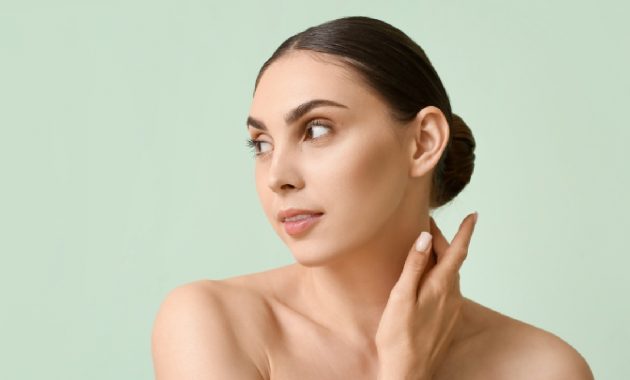Neck pimples are more than you think. It is often triggered by hormones and diet. Try 7 home remedies for neck pimples.
Pimples are a common skin condition that may appear in any area of the body. They typically appear on the face, chest, neck, back, and shoulders. However, when the temperature rises and you wear clothing that exposes your skin to more sunlight, you are more likely to get pimples on your neck. Clogged pores, excess oil or sebum production, and bacteria are common causes of their appearance. While there are numerous over-the-counter treatments available, many people prefer natural remedies for their skin care problems. Find out about the causes of pimples on the neck and how to get rid of neck pimples with home remedies.
What are neck pimples?
Neck pimples or neck acne, scientifically known as acne vulgaris are small, inflamed bumps that occur when pores on the neck become clogged with a combination of excess oil, dead skin cells, and bacteria, as found in a study published in the StatsPearl. Clogged pores provide a breeding ground for bacteria like Propionibacterium acnes, which can cause inflammation. Overproduction of oil and the accumulation of dead skin cells can further contribute to clogged pores and acne, making neck pimples both unsightly and uncomfortable.
What causes neck pimples?
Neck pimples are small, inflamed bumps that can develop on the skin of the neck. They are typically caused by a combination of factors, including:
1. Clogged pores
Clogged pores are a primary cause of neck pimples. When pores become blocked, a combination of factors can contribute to the development of acne. Excess oil produced by the skin can accumulate in the pores, creating a greasy environment that promotes the growth of bacteria. Additionally, dead skin cells can build up on the skin’s surface and clog pores, trapping bacteria and oil inside, as found in a study published in the Biochemistry and Biophysics Reports. This buildup can lead to inflammation and the formation of pimples, often appearing as small, red bumps on the neck.
2. Hormonal changes
Hormonal changes can play a significant role in causing neck pimples. During puberty, both boys and girls experience a surge in hormones, including testosterone and oestrogen, as found in a study published in the Indian Journal of Natural Sciences. These hormones can stimulate oil glands in the skin, leading to increased oil production. This excess oil can clog pores, creating a breeding ground for bacteria and ultimately resulting in the formation of pimples. Additionally, hormonal fluctuations associated with menstruation, stress, or certain medical conditions like polycystic ovary syndrome (PCOS) can also contribute to acne breakouts, including those on the neck.

3. Diet
Some individuals may be sensitive to dairy products, particularly milk and cheese. “These products contain hormones that can stimulate oil production in the skin, potentially leading to acne. If you suspect dairy may be contributing to your acne, consider eliminating it from your diet for a few weeks to see if there’s any improvement,” says skin and hair expert Dr Blossom Kochhar. Plus, a diet high in processed foods and refined carbohydrates, such as sugary snacks, white bread, and pasta, can also influence acne. These foods can spike blood sugar levels, leading to increased insulin production. Insulin can stimulate the production of androgen hormones, which in turn can increase oil production and contribute to pimples.
You may also like


4. Tight clothing
Tight clothing can contribute to neck pimples by creating friction and irritation on the skin. “When clothing rubs against the neck, it can cause micro-tears or damage the skin’s protective barrier. This can make the skin more susceptible to bacteria and inflammation. Additionally, tight clothing can trap sweat and oil, creating a moist environment that promotes the growth of acne-causing bacteria,” explains the expert. This combination of factors can lead to clogged pores, inflammation, and the development of neck pimples.
5. Shaving
Shaving can contribute to neck pimples by causing micro-tears in the skin. “When the razor blades come into contact with the skin, they can create small cuts or abrasions. These tiny injuries can provide entry points for bacteria, which can lead to inflammation and the development of pimples,” says the expert. Additionally, shaving can irritate the skin, especially if it’s done too often or with a dull razor. This irritation can increase the risk of clogged pores and acne breakouts.
Symptoms of neck pimples
Common symptoms of neck pimples are:
- Itching: Neck pimples can cause itchiness and irritation.
- Red or inflamed bumps: They might appear as tiny bumps or inflamed pimples.
- Pain or tenderness: Some neck pimples can be sore to the touch, especially if they are deeply embedded or are with puss.
- Darkness: After healing, these pimples can sometimes leave dark marks or scars.
Home remedies for neck pimples
Here are some easy and effective home remedies to treat neck pimples, according to Dr Blossom Kochhar:
1. Tea tree essential oil
Tea tree essential oil has antibacterial and anti-inflammatory properties that can help reduce acne-causing bacteria and soothe inflamed skin, as found in a study published in the International Journal of Antimicrobial Agents.
How to use: Dilute a few drops of tea tree oil with a carrier oil (like coconut or jojoba oil) and apply it directly to the pimples using a cotton swab. Use 1-2 times a day.
2. Aloe vera
Aloe vera has soothing, anti-inflammatory, and antibacterial properties that can calm irritated skin and helps in healing, as found in a study published in the Indian Journal of Dermatology.
How to use: Extract fresh aloe vera or you can use a store bought aloe vera gel and apply it directly to the neck pimples. Leave it on for 20 minutes and rinse off. Use 2-3 times a day.
3. Ice compress
Ice helps reduce swelling and inflammation, making it useful for larger, painful pimples, as found in a study published in the World Journal of Clinical Cases.
How to use: Wrap an ice cube in a clean cloth and hold it against the pimple for 1-2 minutes at a time. Repeat this process several times a day.
4. Apple cider vinegar
Apple cider vinegar acts as an astringent that helps to balance skin’s pH balance and reduces oil production, as found in a study published in the PlosOne.
How to use: Mix equal parts apple cider vinegar and water, and apply it to the affected areas with a cotton ball. Leave it on for 5-10 minutes, then rinse with water. Use once daily.
5. Turmeric paste
Turmeric has antimicrobial and anti-inflammatory properties that can help fight acne and reduce redness, as found in a study published in the Indian Journal of Dermatology.

How to use: Mix turmeric powder with water or honey to create a paste. Apply it to the affected area and leave it on for 15-20 minutes. Rinse off with water. You apply this pack 2-3 times a week.
6. Green tea
Green tea contains antioxidants and anti-inflammatory properties that reduce redness or inflammation, as per a review published in the Anti-inflammatory & Anti-Allergy Agents in Medicinal Agents.
How to use: Brew green tea, let it cool and apply to the neck using a cotton ball. You can also make a mask by mixing cooled green tea with honey. Leave it on for 15-20 minutes, then rinse. You can use it every day.
7. Honey and cinnamon mask
“Honey is a natural antibacterial and cinnamon has anti-inflammatory properties that can reduce acne and redness,” says the expert.
How to use: Mix 1 tablespoon of honey with ½ teaspoon of cinnamon powder to create a paste. Apply the mixture to the affected areas and leave it on for 10-15 minutes before rinsing off.
Are there any side effects of these home remedies?
Yes, there are potential side effects associated with some home remedies for neck acne. While many natural remedies are generally safe, it is important to be aware of any skin irritation. Some ingredients, such as lemon juice or apple cider vinegar, can be acidic and may irritate sensitive skin. If you experience redness, burning, or itching, discontinue use.
Another side effect you must be aware is an allergic reaction. Individuals with allergies may react to certain natural ingredients. It is essential to patch test any new remedy on a small area of skin before applying it to a larger area.
#Neck #pimples #Symptoms #Home #Remedies
